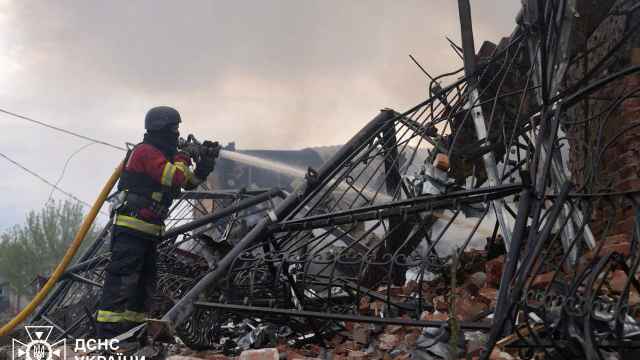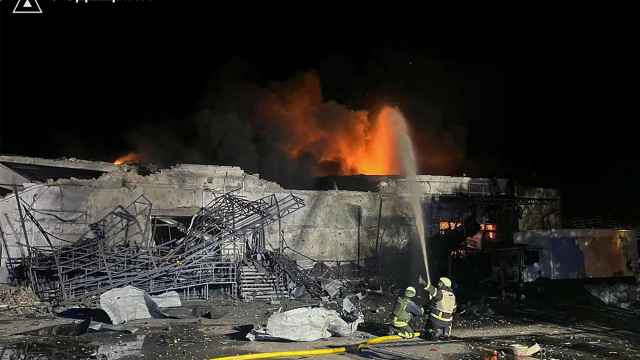ASTANA — Kazakh President Nursultan Nazarbayev reshuffled the nation's top oil officials Wednesday, demoting a long-serving minister in what some observers saw as punishment for the delayed development of the giant Kashagan offshore oil field.
Oil and Gas Minister Sauat Mynbayev, who had held the post since 2007, resigned to be replaced by technocrat Uzakbai Karabalin.
Nazarbayev, who has ruled Kazakhstan for more than two decades, then appointed Mynbayev as the new head of national oil and gas company KazMunaiGas , effectively demoting him.
"I believe one reason behind Mynbayev's resignation is the postponement of commercial output at Kashagan," said Kazakh political analyst Dosym Satpayev. "This issue has long been a headache for the government."
"I think it's all about Kashagan," a source close to the Oil and Gas Ministry added.
Last weekend, Nazarbayev and visiting British Prime Minister David Cameron opened a plant in western Kazakhstan which will process crude flowing from Kashagan in the Caspian Sea, the world's largest oil discovery in five decades.
After several delays, Kashagan is expected to produce its first oil in September, but some industry sources say this new deadline could be missed as well.
"A realistic term would be spring 2014," an oil trader said.
Kazakhstan, the world's ninth largest country by area with a population of 17 million, holds 3 percent of the world's recoverable oil reserves and is the second-largest post-Soviet oil producer after Russia.
Oil has fueled the robust growth of Kazakhstan's gross domestic product, officially forecast to expand by 6 percent this year after a 5 percent rise last year.
Oil production is officially targeted to rise to 82 million tons this year from 79.2 million tons last year, and Kashagan is instrumental in achieving an ambitious official goal of increasing crude output by 60 percent by the end of this decade.
"The tempo of Kazakhstan's economic growth is directly linked to the development of this oilfield, and state officials and ratings agencies alike openly speak about this fact," said Satpayev. "Kashagan's delayed output has long been unnerving the president and the government."
A multinational consortium developing Kashagan says the deposit and nearby fields hold an estimated 35 billion barrels of oil in place, including 9 billion to 13 billion barrels of recoverable oil.
Kazakhstan announced on Tuesday that it was using its preemptive right to buy an 8.4 percent stake in Kashagan from consortium participant ConocoPhillips. The U.S. oil major, which has been selling its assets abroad, said it was selling the stake for about $5 billion.
KazMunaiGas, which entered the project in 2005 and later doubled its stake to 16.81 percent, said on Monday that China's CNPC was set to win ConocoPhillips' stake for more than $5 billion.
During Kashagan's development, production will be gradually ramped up to 370,000 barrels per day (bpd) in a second stage from 180,000 bpd in the first stage in 2013-14, according to North Caspian Operating Company, which is developing the field.
Italy's ENI, U.S. major ExxonMobil, Royal Dutch Shell and France's Total each hold 16.81 percent stakes in Kashagan. Japan's Inpex owns 7.56 percent.
A Message from The Moscow Times:
Dear readers,
We are facing unprecedented challenges. Russia's Prosecutor General's Office has designated The Moscow Times as an "undesirable" organization, criminalizing our work and putting our staff at risk of prosecution. This follows our earlier unjust labeling as a "foreign agent."
These actions are direct attempts to silence independent journalism in Russia. The authorities claim our work "discredits the decisions of the Russian leadership." We see things differently: we strive to provide accurate, unbiased reporting on Russia.
We, the journalists of The Moscow Times, refuse to be silenced. But to continue our work, we need your help.
Your support, no matter how small, makes a world of difference. If you can, please support us monthly starting from just $2. It's quick to set up, and every contribution makes a significant impact.
By supporting The Moscow Times, you're defending open, independent journalism in the face of repression. Thank you for standing with us.
Remind me later.





